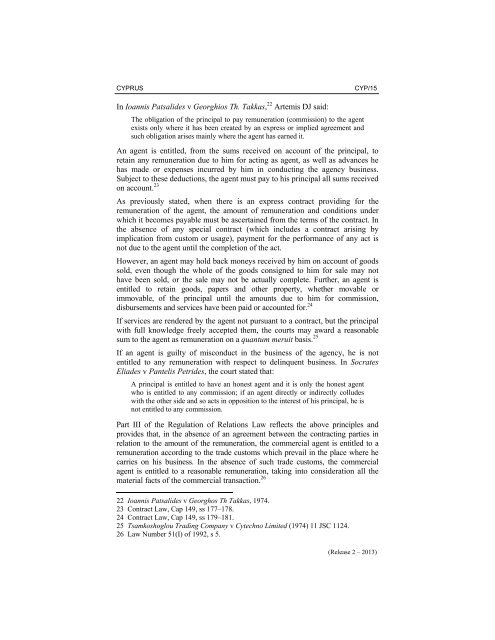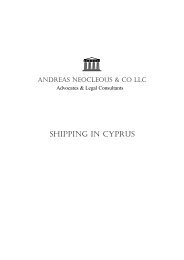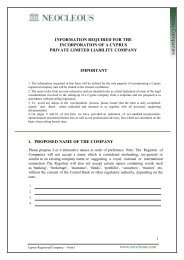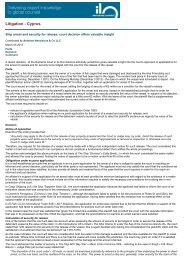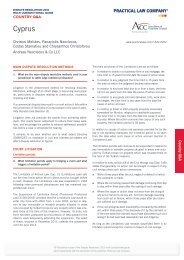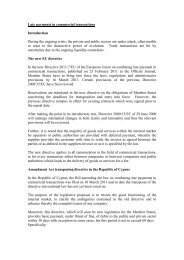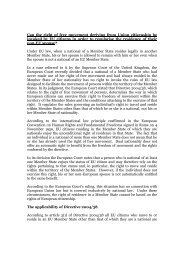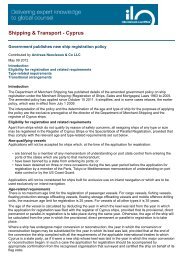Cyprus - Andreas Neocleous & Co
Cyprus - Andreas Neocleous & Co
Cyprus - Andreas Neocleous & Co
You also want an ePaper? Increase the reach of your titles
YUMPU automatically turns print PDFs into web optimized ePapers that Google loves.
CYPRUS<br />
CYP/15<br />
In Ioannis Patsalides v Georghios Th. Takkas, 22 Artemis DJ said:<br />
The obligation of the principal to pay remuneration (commission) to the agent<br />
exists only where it has been created by an express or implied agreement and<br />
such obligation arises mainly where the agent has earned it.<br />
An agent is entitled, from the sums received on account of the principal, to<br />
retain any remuneration due to him for acting as agent, as well as advances he<br />
has made or expenses incurred by him in conducting the agency business.<br />
Subject to these deductions, the agent must pay to his principal all sums received<br />
on account. 23<br />
As previously stated, when there is an express contract providing for the<br />
remuneration of the agent, the amount of remuneration and conditions under<br />
which it becomes payable must be ascertained from the terms of the contract. In<br />
the absence of any special contract (which includes a contract arising by<br />
implication from custom or usage), payment for the performance of any act is<br />
not due to the agent until the completion of the act.<br />
However, an agent may hold back moneys received by him on account of goods<br />
sold, even though the whole of the goods consigned to him for sale may not<br />
have been sold, or the sale may not be actually complete. Further, an agent is<br />
entitled to retain goods, papers and other property, whether movable or<br />
immovable, of the principal until the amounts due to him for commission,<br />
disbursements and services have been paid or accounted for. 24<br />
If services are rendered by the agent not pursuant to a contract, but the principal<br />
with full knowledge freely accepted them, the courts may award a reasonable<br />
sum to the agent as remuneration on a quantum meruit basis. 25<br />
If an agent is guilty of misconduct in the business of the agency, he is not<br />
entitled to any remuneration with respect to delinquent business. In Socrates<br />
Eliades v Pantelis Petrides, the court stated that:<br />
A principal is entitled to have an honest agent and it is only the honest agent<br />
who is entitled to any commission; if an agent directly or indirectly colludes<br />
with the other side and so acts in opposition to the interest of his principal, he is<br />
not entitled to any commission.<br />
Part III of the Regulation of Relations Law reflects the above principles and<br />
provides that, in the absence of an agreement between the contracting parties in<br />
relation to the amount of the remuneration, the commercial agent is entitled to a<br />
remuneration according to the trade customs which prevail in the place where he<br />
carries on his business. In the absence of such trade customs, the commercial<br />
agent is entitled to a reasonable remuneration, taking into consideration all the<br />
material facts of the commercial transaction. 26<br />
22 Ioannis Patsalides v Georghos Th Takkas, 1974.<br />
23 <strong>Co</strong>ntract Law, Cap 149, ss 177–178.<br />
24 <strong>Co</strong>ntract Law, Cap 149, ss 179–181.<br />
25 Tsamkoshoglou Trading <strong>Co</strong>mpany v Cytechno Limited (1974) 11 JSC 1124.<br />
26 Law Number 51(I) of 1992, s 5.<br />
(Release 2 – 2013)


